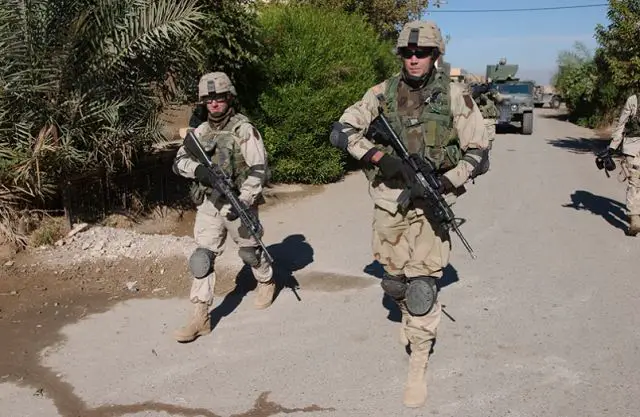| a | |||
Defence & Security News - United States |
|||
| Saturday, October 19, 2013 11:42 AM | |||
More
than 3,500 soldiers of the First Infantry Division of U.S. Army to conduct
100 missions in Africa. |
|||
| Here on
the Kansas plains, thousands of soldiers once bound for Iraq or Afghanistan
are now gearing up for missions in Africa as part of a new Pentagon strategy
to train and advise indigenous forces to tackle emerging terrorist threats
and other security risks so that American forces do not have to. |
|||
 Soldiers from the 2nd Brigade Combat Team, 1st Infantry Division patrol Iraq in 2004. The brigade will be teaming up with AFRICOM for rotational missions that will train and send small units to Africa as needed. |
|||
| The first-of-its-kind program is drawing on troops from a 3,500-member brigade in the Army’s storied First Infantry Division, known as the Big Red One, to conduct more than 100 missions in Africa over the next year. The missions range from a two-man sniper team in Burundi to 350 soldiers conducting airborne and humanitarian exercises in South Africa. The brigade has also sent a 150-member rapid-response force to Djibouti in the Horn of Africa to protect embassies in emergencies, a direct reply to the attack on the United States Mission in Benghazi, Libya, last year, which killed four Americans. “Our
goal is to help Africans solve African problems, without having a big
American presence,” said Lt. Col. Robert E. Lee Magee, a West Point
graduate and third-generation Army officer whose battalion has sent troops
to Burundi, Niger and South Africa in the past several months, and whose
unit will deploy to Djibouti in December. But with the United States military out of Iraq and pulling out of Afghanistan, the Army is looking for new missions around the world. “As we reduce the rotational requirement to combat areas, we can use these forces to great effect in Africa,” Gen. David M. Rodriguez, the head of the Africa Command, told Congress this year. Missions that were once performed largely by Special Operations forces, including the Army’s Green Berets, are now falling to regular infantry troops like members of the Second Armored Brigade Combat Team, nicknamed the Dagger Brigade, here at Fort Riley. This summer, nearly two dozen of the brigade’s soldiers deployed to Niger, in West Africa, to help train troops for United Nations peacekeeping duty in neighboring Mali. The Americans set up tents on a government-owned farm two hours north of the capital, Niamey, shooing away the goats, cows and chickens. For 10 weeks, they weathered sandstorms and temperatures that soared beyond 110 degrees to teach the Nigerien troops marksmanship, patrolling skills and medical care. The troops drilled in the morning, rested from the midday heat and then resumed classes in the evening. Among the worries in Niger is the threat posed by Boko Haram, an Islamic militant group with ties to Al Qaeda. |
|||
More than 3,500 soldiers of First Infantry Division US Army to conduct 100 missions in Africa 191013
- Posted On














